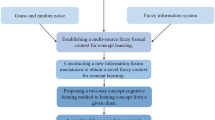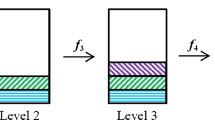Abstract
Concept-cognitive learning (CCL) is to make machines like human beings have the ability of summarizing and reasoning. Automatically learn and find concepts from given information clues is a research focus of CCL. The existing researches mainly focuses on the concept learning methods in classical and fuzzy formal contexts, but there are few researches on the CCL of interval-valued contexts. In view of the universality of interval values in practical applications, we study the mechanism of CCL in interval-valued formal contexts. Firstly, we propose interval-valued formal contexts and a pair of dual cognitive operators as the fundamental foundation of concept learning. Then we mine the relationship between interval-valued information granules and concepts from cognitive learning and granular computing perspective. Then we systematically study the mechanism of interval-valued CCL from the establishment of interval-valued information granules (IvIGs) and its mathematical properties, and the transformation between different information granules (IGs) and clue oriented concept learning. Moreover, three algorithms are established to automatically learn concepts from different clue information. Finally, we download eight public data sets to verify the effectiveness and feasibility of the proposed algorithms from the perspective of the size of extension of concepts, running time of concept learning algorithms and the number of concepts learned by the concept learning algorithms. The experimental comparison indicates that the proposed algorithms are effective and feasible for interval-valued CCL.




Similar content being viewed by others
References
Bargiela A, Pedrycz W (2008) Toward a theory of granular computing for human-centred information processing. IEEE Trans Fuzzy Syst 16(2):320–330
Benítez-Caballero MJ, Medina J, Ramírez-Poussa E, Ślȩzak D (2020) Rough-set-driven approach for attribute reduction in fuzzy formal concept analysis. Fuzzy Sets Syst 391:117–138
Cabrerizo FJ, AI-Hmouz R, Morfeq A, Martínez MÁ, Pedrycz W, Herrera-Viedma E, (2020) Estimating incomplete information in group decision making: a framework of granular computing. Appl Soft Comput 86:105930
Che XY, Chen DG, Mi JS (2020) A novel approach for learning label correlation with application to feature selection of multi-label data. Inf Sci 512:795–812
Dua D, Graff C (2019) UCI machine learning repository. University of California, School of Information and Computer Science, Irvine. http://archive.ics.uci.edu/ml
Formica A (2019) Similarity reasoning in formal concept analysis: from one-to many-valued contexts. Knowl Inf Syst 60(2):715–739
Ganter B, Wille R (1999) Formal concept analysis: mathematical foundations. Springer, Berlin
Gjicali K, Finn BM, Hebert D (2020) Effects of belief generation on social exploration, culturally-appropriate actions, and cross-cultural concept learning in a game-based social simulation. Comput Educ 156:103959
Guan ZY, Zhang LJ, Peng JY, Fan J (2015) Multi-view concept learning for data representation. IEEE Trans Knowl Data Eng 27(11):3016–3028
Guo QC, Ma JM (2020) Judgment methods of interval-set consistent sets of dual interval-set concept lattices (in Chinese). Comput Sci 3:98–102
Guo Y, Tsang ECC, Xu W et al (2019) Local logical disjunction double-quantitative rough sets. Inf Sci 500:87–112
Guo Y, Tsang ECC, Xu W, Chen D (2020) Adaptive weighted generalized multi-granulation interval-valued decision-theoretic rough sets. Knowl Based Syst 187:104804
Guo Y, Tsang ECC, Hu M et al (2020) Incremental updating approximations for double-quantitative decision-theoretic rough sets with the variation of objects. Knowl Based Syst 189:105082
Hu M, Tsang ECC, Guo YT, Xu WH (2021) Fast and robust attribute reduction based on the separability in fuzzy decision systems. IEEE Trans Cybern. https://doi.org/10.1109/TCYB.2020.3040803
Hu M, Tsang ECC, Guo YT, Chen DG, Xu WH (2021) A novel approach to attribute reduction based on weighted neighborhood rough sets. Knowl Based Syst 220:Art. 106908. https://doi.org/10.1016/j.knosys.2021.106908
Hu M, Tsang ECC, Guo YT, Xu WH, Chen DG (2020) A fast reduction algorithm with attribute pre-sort based on neighborhood rough set. In: 2020 international conference on machine learning and cybernetics (ICMLC), pp 279–284
Ishwarya MS, Kumar AC (2020) Decision-making in cognitive paradoxes with contextuality and quantum formalism. Appl Soft Comput 95(5):106521
Kumar CA, Mouliswaran SC, Amriteya P, Arun SR (2015) Fuzzy formal concept analysis approach for information retrieval. In: Proc. 5th int. conf. fuzzy neuro comput (FANCCO), pp 255–271
Kuznetsov SO (2004) Machine learning and formal concept analysis. In: Proc. int. conf. formal concept anal. (ICFCA), pp 23–26
Leung Y, Fischer MM, Wu WZ, Mi JS (2008) A rough set approach for the discovery of classification rules in interval valued information systems. Int J Approx Reason 47(2):233–246
Li JH, Mei CL, Xu WH, Qian Y (2015) Concept learning via granular computing: a cognitive viewpoint. Inf Sci 298:447–467
Li JH, Huang CC, Qi JJ, Qian Y, Liu W (2017) Three-way cognitive concept learning via multi-granularity. Inf Sci 378:244–263
Li JH, Mi YL, Liu WQ (2019) Incremental cognition of concepts: theories and methods (in Chinese). Chin J Comput 42:2233–2250
Loia V, Orciuoli F, Pedrycz W (2018) Towards a granular computing approach based on formal concept analysis for discovering periodicities in data. Knowl Based Syst 146:1–11
Ma JM, Cai MJ, Zou CJ (2017) Concept acquisition approach of object-oriented concept lattices. Int J Mach Learn Cybern 8(1):123–134
Ma JM, Hu LL, Qian YH (2019) Object-oriented interval-set concept lattices. Int J Approx Reason 110:64–81
Mi JS, Leung Y, Wu WZ (2010) Approaches to attribute reduction in concept lattices induced by axialities. Knowl Based Syst 23(6):504–511
Mi YL, Shi Y, Li JH, Liu WQ, Yan MY (2020) Fuzzy-based concept learning method: Exploiting data with fuzzy conceptual clustering. IEEE Trans Cybern. https://doi.org/10.1109/TCYB.2020.2980794
Mi YL, Liu WQ, Shi Y, Li JH (2020) Semi-supervised concept learning by concept-cognitive learning and concept space. IEEE Trans Knowl Data Eng. https://doi.org/10.1109/TKDE.2020.3010918
Niu JJ, Huang CC, Li JH, Fan M (2018) Parallel computing techniques for concept-cognitive learning based on granular computing. Int J Mach Learn Cybern 9:1785–1805
Pedrycz W (2013) Granular computing analysis and design of intelligent systems. CRC Press, Boca Raton
Savchenko AV (2016) Fast multi-class recognition of piecewise regular objects based on sequential three-way decisions and granular computing. Knowl Based Syst 19:252–262
Shao M, Yang H (2013) Two kinds of multi-level formal concepts and its application for sets approximations. Int J Mach Learn Cybern 4(6):621–630
Shi Y, Mi Y, Li J, Liu W (2019) Concurrent concept-cognitive learning model for classification. Inf Sci 496:65–81
Shivhare R, Kumar CA, Li JH (2017) Establishment of cognitive relations based on cognitive informatics. Cogn Comput 9(5):721–729
Shivhare R, Kumar CA (2017) Three-way conceptual approach for cognitive memory functionalities. Int J Mach Learn Cybern 8(1):21–34
Singh PK, Kumar CA (2014) Bipolar fuzzy graph representation of concept lattice. Inf Sci 288:437–448
Singh PK, Kumar CA, Li JH (2016) Knowledge representation using interval-valued fuzzy formal concept lattice. Soft Comput 20(4):1485–1502
Singh PK (2019) Bipolar fuzzy concept learning using next neighbor and Euclidean distance. Soft Comput 23(12):4503–4520
Wang H, Cui PZ (2015) Analysis of interval-valued decision formal contexts. J Intell Fuzzy Syst 29(4):1565–1574
Wei L, Qian T, Wan Q, Qi JJ (2018) A research summary about triadic concept analysis. Int J Mach Learn Cybern 9(4):699–712
Wei L, Liu L, Qi JJ, Qian T (2020) Rules acquisition of formal decision contexts based on three-way concept lattices. Inf Sci 516:529–544
Wille R (1982) Restructuring lattice theory: an approach based on hierarchies of concepts. In: Rival I (ed) Ordered sets. Reidel, Dordrecht, pp 445–470
Wu WZ, Leung Y, Mi JS (2009) Granular computing and knowledge reduction in formal contexts. IEEE Trans Knowl Data Eng 21(10):1461–1474
Xu WH, Pang JZ, Luo SQ (2014) A novel cognitive system model and approach to transformation of information granules. Int J Approx Reason 55:853–866
Xu WH, Li WT (2016) Granular computing approach to two-way learning based on formal concept analysis in fuzzy datasets. IEEE Trans Cybern 46(2):366–379
Yahia BS, Jaoua A (2001) Discovering knowledge from fuzzy concept lattice. In: Data mining and computational intelligence. Physica, Berlin, pp 167–190
Yao YY (2009) Interpreting concept learning in cognitive informatics and granular computing. IEEE Trans Syst Man Cybern B Cybern 39(4):855–866
Yao YY (2020) Three-way granular computing, rough sets, and formal concept analysis. Int J Approx Reason 116:106–125
Zadeh LA (1979) Fuzzy sets and information granularity, advances in fuzzy set theory and applications. North-Holland Publishing, Amsterdam
Zhang WX, Xu WH (2007) Cognitive model based on granular computing. Chin J Eng Math 24:957–971
Zhang T, Li HH, Liu MQ, Rong M (2020) Incremental concept-cognitive learning based on attribute topology. Int J Approx Reason 118:173–189
Zhao YX, Li JH, Liu WQ, Xu WH (2017) Cognitive concept learning from incomplete information. Int J Mach Learn Cybern 8(1):159–170
Acknowledgements
This work is supported by the Macau Science and Technology Development Fund (No. 0019/2019/A1 and No. 0075/2019/A2), the National Natural Science Foundation of China (No. 62106148, No. 61976245 and No. 61772002), and the Project funded by China Postdoctoral Science Foundation under Grant No. 2021M702259.
Author information
Authors and Affiliations
Corresponding author
Additional information
Publisher's Note
Springer Nature remains neutral with regard to jurisdictional claims in published maps and institutional affiliations.
Rights and permissions
About this article
Cite this article
Hu, M., Tsang, E.C.C., Guo, Y. et al. A novel approach to concept-cognitive learning in interval-valued formal contexts: a granular computing viewpoint. Int. J. Mach. Learn. & Cyber. 13, 1049–1064 (2022). https://doi.org/10.1007/s13042-021-01434-1
Received:
Accepted:
Published:
Issue Date:
DOI: https://doi.org/10.1007/s13042-021-01434-1




